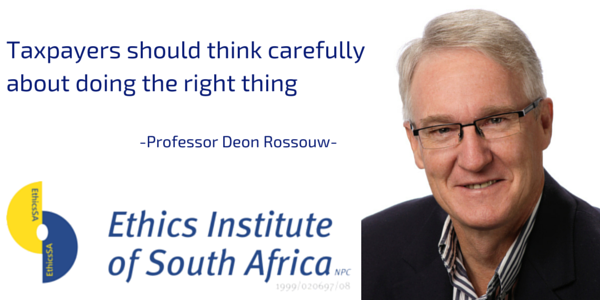|
In the wake of the first hike in personal income tax for 20 years the willingness of citizens to pay tax will be an indication of the strength of the social contract—the mutually beneficial agreement that commits government and citizens to work together to maintain a sustainable community.
“Tax morale—the willingness of citizens to pay their taxes—has sunk to new levels prompted by the small increase in personal tax plus an increase in other taxes such as the Road Accident Fund levy on the fuel price. The high levels of citizen unhappiness, and talk of a tax revolt, are an indication that our social contract is under strain,” says Professor Deon Rossouw, CEO of the Ethics Institute of South Africa (EthicsSA). “Government and citizens are both parties in this social contract, and both need to take decisive action to repair it.” The preface to a working paper on tax morale in developing countries for the Organisation of Economic Co-operation and Development (OECD), states “…at a deeper level, taxation and fiscal policy are at the core of every society’s social contract. Citizens pay their taxes in exchange for public services and goods”. The OECD goes on to make the critical point that this exchange legitimates the political dispensation and the state itself.* For the social contract to work, both parties have to honour their commitments. At present, though, citizens are beginning to question whether it is just to suffer additional taxes when the state is not fulfilling its part of the bargain. High levels of corruption, and fruitless and wasteful expenditure, coupled with sub-optimal service delivery are all prompting taxpayers to question the moral foundation of additional taxes. The perceived failure of the state to honour its obligations to taxpayers is worsened by the growing belief that the integrity of SARS, the tax-collection agency, has been compromised. Once seen as the cleanest and most effective organ of state, SARS is currently plagued by controversy—so much so that the Finance Minister has had to appoint an advisory committee to investigate. More worrying over the long term, though, are growing reports that SARS is becoming less even-handed in its treatment of taxpayers, and that individuals with powerful connections merit a different approach from SARS. Professor Rossouw points out that tax collection has to be seen to be fair, transparent and predictable in order to protect tax morale. This is particularly important given the far-ranging powers conferred on SARS to collect taxes it deems are owed. SARS officials find themselves in a position where they can be tempted to use their position to enrich themselves, thus making it imperative that the organisation ensure that its internal ethics is managed effectively. “Taxpayers who avoid paying their taxes are indeed guilty of putting the social contract at risk, and they should think carefully about doing the right thing. But, equally important, the state has to put its own house in order avoid tax revolt by citizens, and thus a breakdown of the social contract,” Professor Rossouw concludes. * Christian Daude, Hamlet Gutiérrez and Ángel Melguizo, “What drives tax morale?”, Working paper No. 315, OECD, available at http://www.oecd.org/dev/americas/WP315%20AE.pdf. ENDS MEDIA CONTACT: Juanita Vorster, 079 523 8374, [email protected], www.atthatpoint.co.za For more information on EthicsSA please visit: Website: www.ethicssa.org LinkedIn: Ethics Institute of South Africa Facebook: Ethics Institute of South Africa  Prof Deon Rossouw warns that zero tolerance policies need the right balance between encouragement and punishment. Prof Deon Rossouw warns that zero tolerance policies need the right balance between encouragement and punishment. Companies or institutions, particularly those who have suffered a scandal of some kind, often resolve on a zero-tolerance policy for unethical behaviour. But this policy is likely to backfire if the right approach isn’t adopted, says the Ethics Institute of South Africa (EthicsSA). “A scandal has a hugely negative impact on an organisation and usually results in personal humiliation for its members, so deciding ‘never again’ is both understandable and laudable,” says Professor Deon Rossouw, CEO of EthicsSA. “But care needs to be taken because zero tolerance often translates into an overwhelming focus on the strict policing of rules, and that’s an approach that is not sustainable and can even be counterproductive.” The real issue here is the difference between extrinsic and intrinsic motivation for actions. A focus on policing and enforcement means that individuals never internalise, and appropriate for themselves, the desired ethical principles. The unintended consequence is a mindset of “if it’s not forbidden, then it must be allowed”, simply because people become used to being told what to do, and do not apply their minds to doing the right thing. In fact, it can be that people then begin to exercise their creativity to get round the rules and, as we all know, human creativity seems to be inexhaustible in this area! Professor Rossouw says that the same factors can be seen at play when it comes to safety regulations, say at a mine after a fatality. Managers often observe that the moment employees leave the work environment with its strict safety rules, they indulge in highly unsafe practices. In other words, the safety-first principle has not been internalised. To realise the intention behind a zero-tolerance approach—to prevent any future ethical breaches from occurring—it is necessary to take the longer route of convincing an organisation’s members that ethical behaviour is beneficial to them and the organisation, and is thus worthwhile on its own account. As part of driving this message home, he says, the greatest effort should go into recognizing and praising those who do act ethically, setting them up as role models, with much less time spent on policing and enforcement. According to Susan Krauss Whitbourne, Professor of Psychology at the University of Massachusetts Amherst, we model our behaviour on “individuals whose actions seem to be getting rewarded”.1 It’s thus vital that organisations pay due attention to rewarding publicly individuals who act ethically, in small and large matters. As part of the same process, the organisation’s commitment to ethical behaviour needs to be made crystal clear in the words and actions of its leaders, and everybody who infringes the ethical code must be held strictly to account. “It’s a question of striking the right balance between encouragement of the right behaviours and punishment of the wrong behaviours,” Professor Rossouw concludes. “It’s not that we shouldn’t formulate and enforce rules, but we have to get the context right in order to change convictions—that way, we will change the way people behave even when nobody is watching.” 1 Susan Krauss Whitbourne, “We all need role models to motivate and inspire us”, Pyschology Today 19 November 2013, available at https://www.psychologytoday.com/blog/fulfillment-any-age/201311/we-all-need-role-models-motivate-and-inspire-us ENDS MEDIA CONTACT: Juanita Vorster, 079 523 8374, [email protected], www.atthatpoint.co.za For more information on EthicsSA please visit: Website: www.ethicssa.org LinkedIn: Ethics Institute of South Africa Facebook: Ethics Institute of South Africa |
Welcome to the newsroom of The Ethics Institute. For media releases prior to August 2014 please click here.
Archives
August 2017
Categories
All
|


 RSS Feed
RSS Feed